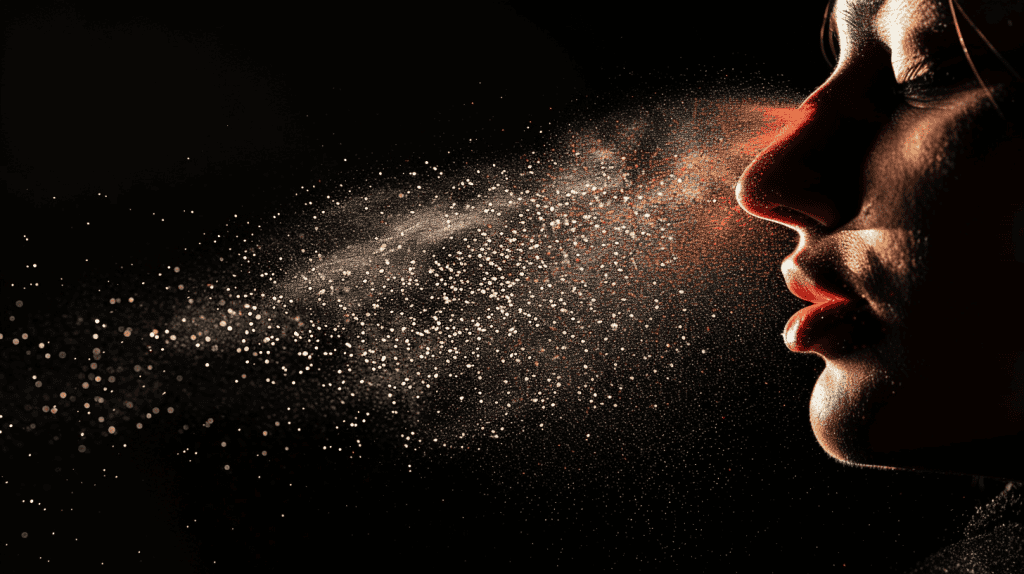
free shipping on orders over $50
We're having a sale on all our products. Enter your email below to be notified about future sales.




Accidentally spraying yourself with pepper spray can be a painful experience, with burning eyes, difficulty breathing, and skin irritation. First, get to fresh air fast and resist rubbing the area, which worsens the pain. If you wear contacts, remove them carefully. Rinse your eyes and skin with cool water, but steer clear of using soap near your eyes. Take off the contaminated clothing and handle it cautiously. If you’re still feeling rough after a while, seeking medical attention can be a good idea. Effects usually peak at around 15–30 minutes, but you’ll start feeling better after 40 minutes or so. Stick around to discover more helpful tips!
When you accidentally spray yourself with pepper spray, your first priority should be to move to fresh air immediately. This will help reduce inhalation of the irritant. But what else should you do? Let’s explore further.
First, resist the urge to rub the affected area. Rubbing can spread the substance and make things worse. Instead, flush the area with cool water. If your eyes are hit, remove any contact lenses carefully, as they can trap the spray and increase irritation. This step can’t be stressed enough—clean water is your best friend here.
Next, take off any contaminated clothing. You don’t want to keep re-exposing yourself to the pepper spray. Be mindful of how you handle these clothes; tossing them into the laundry without isolating them can spread the irritant to other items.
If the burning sensation or difficulty breathing persists, don’t hesitate—seek medical attention. Prolonged exposure can lead to more severe symptoms. It’s always better to be safe than sorry.
After flushing the affected area with cool water, immediately move to fresh air to prevent further inhalation of pepper spray residue. The open air is your best friend in this situation. It helps reduce the intensity of the pepper spray’s effects on your respiratory system, making it easier to breathe and more comfortable overall.
Don’t stay in confined spaces; you want to allow the pepper spray particles to disperse. The quicker they dissipate, the faster you’ll start to feel better. Moving to fresh air aids in reducing that nasty burning sensation and the discomfort that comes with exposure.
Imagine it like airing out a stuffy room—fresh air helps clear everything out. Breathing in fresh air can do wonders for your recovery process. It promotes quicker relief by ventilating the area and helping to diminish the lingering effects of the pepper spray. Even a gentle breeze can assist in the dispersion of those pesky particles.
Quickly flush your eyes with cool water to remove the pepper spray residue and soothe irritation. It’s essential to act fast because the quicker you start flushing, the sooner you’ll find relief. Hold your head under a faucet or use a clean container to gently pour water over your eyes. Aim to keep your eyes open as much as possible while flushing; rapid blinking can help expel the chemical.
Avoid using soap near your eyes—it can make the irritation worse. Instead, stick to just water. This simple yet effective method helps to minimize the duration of discomfort and reduce potential damage. If you’re still feeling intense irritation after several minutes of flushing, don’t hesitate to seek medical attention.
Here’s a quick look at what you might be feeling and the relief you can expect:
| Feeling | Action | Relief Time |
|---|---|---|
| Immediate burning | Start flushing | Within seconds |
| Ongoing stinging | Continue flushing | Several minutes |
| Persistent pain | Seek medical help | Varies by case |
Once your eyes are flushed, it’s time to focus on cleaning your skin to remove any lingering pepper spray residue. It’s important to act promptly to minimize discomfort and prevent further irritation.
Here’s a simple guide to help you through the process:
Removing contaminated clothing is essential to halt the spread of pepper spray and prevent more skin irritation. Carefully take off any exposed clothing, making sure not to touch your face or other parts of your body.
Dispose of the contaminated items properly, following CDC recommendations, to guarantee everyone’s safety.
To minimize irritation, you should immediately take off any clothing that has come into contact with pepper spray. When pepper spray hits your clothes, the oleoresin capsicum in it can linger and cause skin irritation. Quick clothing removal is essential to prevent the contaminated clothing from spreading the residue to other parts of your body or even other people.
Here’s what you should do:
Proper disposal of contaminated clothing helps guarantee you don’t accidentally re-expose yourself or others to the lingering effects of pepper spray. When you accidentally spray yourself, the first step is to get out of those contaminated clothes immediately. Trust me, you don’t want to prolong the agony or risk skin irritation.
Now, let’s talk proper disposal methods. Don’t just toss the contaminated clothing into your laundry basket. That’s a recipe for re-exposure. Instead, carefully place the contaminated items in a plastic bag. Seal it tight, like you’re safeguarding your lunch from a mischievous fridge thief. This prevents any pepper spray residue from spreading.
If you’re feeling eco-friendly, you might be tempted to wash the clothes and reuse them. You can, but be cautious. Wash the contaminated clothing separately, and consider running an empty wash cycle afterward to clear out any lingering oleoresin capsicum.
One common mistake is rubbing your eyes, which only worsens the spread and intensity of the pepper spray. When you accidentally get pepper spray in your eyes, the immediate reaction might be to rub them, but resist this urge. Instead, follow these steps to mitigate the discomfort and potential harm:
Don’t forget, if symptoms persist or worsen, seek medical attention promptly. It’s always better to be safe than sorry. Remember, handling pepper spray responsibly can prevent these mishaps, but knowing how to react is vital if accidents do happen. Stay calm, follow these steps, and you’ll be back to normal in no time.
Recognizing when to seek medical help after an accidental pepper spray exposure is essential for your health and safety. If you experience severe symptoms like difficulty breathing or chest pain, don’t hesitate—seek medical help immediately. These symptoms indicate that your body is having a strong adverse reaction, and professional assistance is critical to preventing complications.
Persistent or worsening symptoms also warrant a visit to a healthcare provider. If the burning sensation, redness, or pain doesn’t subside, it’s time to get a medical evaluation. The experts will assess your condition and provide the appropriate care, ensuring you manage any lingering effects effectively.
In severe cases, immediate medical attention is vital. Contact Poison Control at 1-800-222-1222 or head to the nearest healthcare facility without delay. The quicker you get professional assistance, the better your chances of avoiding long-term issues.
Understanding the duration of effects after accidentally spraying yourself with pepper spray can help you manage your symptoms more effectively. When you experience accidental exposure, the immediate effects, like a burning sensation and coughing, can be quite overwhelming. The overall duration of these effects typically lasts up to 40 minutes, but in some cases, they may persist for up to an hour.
The intensity of skin irritation can vary depending on the concentration of the pepper spray. During this time, the irritated tissues will gradually start to calm down.
Here’s a quick breakdown of what to expect:
To prevent future accidents with pepper spray, always store it in a secure location out of children’s reach. This simple step can greatly reduce the risk of accidental exposure.
When handling pepper spray, be conscious of where your hands are—avoid touching your face or eyes to minimize self-contamination. It might seem obvious, but these small habits can prevent big mishaps.
Make sure you educate yourself on the correct usage and handling of pepper spray. Read the instructions and perhaps watch a few tutorials. Knowing how to use it properly will help you prevent accidents.
Also, don’t forget to check the expiration date on your pepper spray. An expired canister mightn’t work when you need it most, or worse, it could malfunction and cause an accident.
Consider taking a self-defense class. These classes often cover how to use pepper spray effectively in emergencies and can give you a better understanding of how to handle it safely. Not to mention, it’s a great confidence booster!
Virtuous Protection
15900 W. 10 mile Rd.
Suite 211-1397
Southfield, MI 48075
Call us toll free: (800) 897-0194
